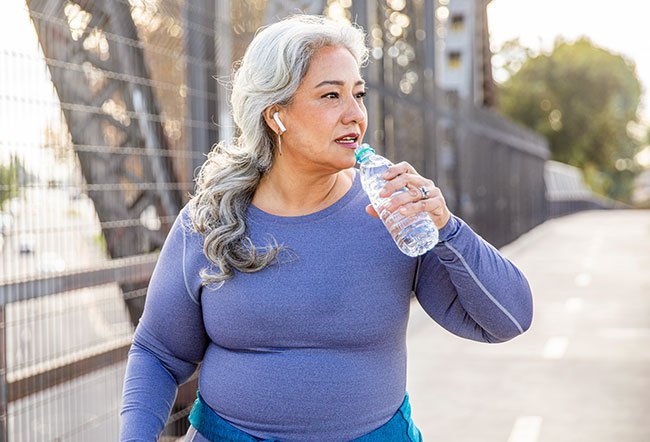What Are the Benefits of Drinking a Lot of Water?

Water is extremely important for your health and well-being, and every cell, tissue, and organ in your body needs water to work properly. And since we lose water every day from sweating, urinating, and other activities, drinking plenty of water is crucial to avoid dehydration.
6 benefits of drinking plenty of water
- Maintains balance of body fluids: Your body is made up of more than 60% water, and these body fluids help in digestion, circulation, transportation of nutrients, saliva formation, and body temperature maintenance.
- Helps control weight: Water has no calories, and drinking water makes you feel full. Foods with high water content such as fruits, vegetables, and broth-based soups can help you reduce your calorie intake.
- Keeps your skin looking good: Your skin contains a lot of water and acts as a protective barrier to prevent fluid loss, locking in moisture and preventing your skin from looking wrinkled and dry.
- Energizes muscles: Your muscles need water to perform at their best, especially during physical activity. Not drinking enough water can lead to fatigue and reduced concentration.
- Protects kidney function: Your kidneys excrete water-soluble wastes and toxins through the body as urine. Staying well hydrated reduces the risk of kidney stones and other problems.
- Promotes bowel movements: Water is vital for keeping things moving in your body and getting rid of wastes through your digestive tract. If your body does not have enough body fluids, your colon absorbs fluid from stool, which may result in constipation.
How much water do you need to drink per day?
About 20% of the fluid you need comes from what you eat and the remaining 80% from what you drink. Daily fluid intake varies depending on your age, weight, and climate.
The National Academies of Sciences, Engineering and Medicine recommends the following:
- About 15.5 cups (125 ounces) of fluids every day for men
- About 11.5 cups (91 ounces) of fluids every day for women
In some cases, you may need to drink more water:
- Exercise: Physical activity increases water loss, so you need to drink enough water during and after your workouts to replenish your fluids.
- Environment: Hot and humid climates make you sweat more, so it’s important to increase your water intake during warmer months.
- Illness: Illnesses such as fever, vomiting, diarrhea, bladder infection, or kidney stones require you to drink more fluids.
- Pregnancy and breastfeeding: You need to drink more fluids during pregnancy and breastfeeding to stay properly hydrated.
What are signs you are not drinking enough water?
If you are not drinking enough fluids, your body may show signs of dehydration, which include:
- Headache
- Muscle cramps
- Dizziness
- Dark colored urine with an unpleasant smell (you may be unable to pee enough, which may put you at an increased risk of a urinary tract infection)
Your fluid intake is adequate:
- If your urine is colorless or light yellow
- When you pinch a small fold of your skin and release it, it goes back to normal right away (if you are dehydrated, it takes a longer time for the skin to go back to normal)
